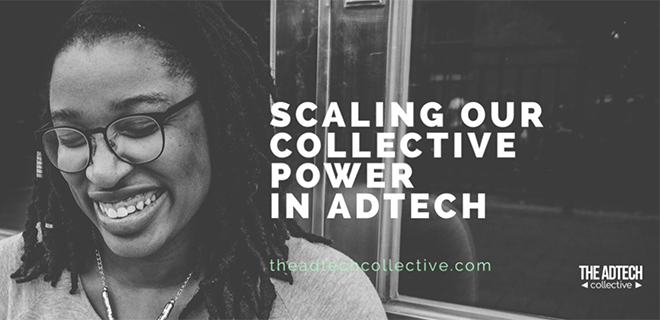
We’ve been talking a lot about diversity and inclusion within ad tech and whether there are systemic issues in the industry when it comes to employment practices,—especially as it regards career mobility for people from diverse backgrounds.
In fact, at AdMonsters’ recent PubForum Virtual Summer there were two sessions that dealt with the topic: Operationalizing Inclusion and Minority Report Podcast: Live From AdMonsters Publisher Forum Virtual.
We caught up with Alicia Ray, Founder of The Ad Tech Collective, a community for Black people in ad tech to network and learn from one another within ad tech. She was a participant on the Minority Report Podcast Live session and she has some great ideas about how companies can get serious about their DEI efforts.
Lynne d Johnson: How did you get started in ad tech?
Alicia Ray: I actually ended up in ad tech like most people, by accident. I generally have a deep passion for media, advertising art and tech. I also firmly believe education unlocks experiences and I became very curious about what sat under the hood of many of the tools I leveraged during the early years of my career.
To give more context, I spent a great deal disappointing a lot of people by not pursuing a traditional career path. I spent my undergraduate years exploring fine art and graphic design—there was something about bringing concepts to life that was very intriguing to me. I eventually landed a few exciting opportunities to work in media and eventually completed my Master of Art in Interactive Media at Long Island University C.W. Post. After graduate school, I ended up taking a job in Product Marketing for a media company and from there explored a number of areas in Advanced TV and the rest has been history.
LdJ: What was the impetus behind launching the Ad Tech Collective?
AR: I have joined a number of orgs that catered to the needs of “minorities” across the tech, media, and advertising spaces independently. None of them truly focused specifically on the “Black experience” in ad tech nor did they address some of the specific challenges we face in the space.
Let’s keep it honest and straightforward, we have made genuine progress in penetrating the advertising, media, and tech sector, but racial diversity in the ad tech industry continues to grow at an unimpressive pace. Black people in ad tech are still underrepresented, often the “only” in their workplace with limited access to mainstream networks and opportunities.
I launched AdTech Collective last fall as a response to this niche vertical often left out of the bigger discussion and the idea that we were not in ad tech. While we are far and few between, I wanted people to know we were here and doing amazing work. I wanted us to be seen, have access to the resources and the networks to keep building, and unlock new opportunities.
LdJ: What are your main goals with the organization?
AR: My main goal with the organization is to create a safe space where Black people in ad tech and allies can connect, deepen our knowledge and unlock meaningful experiences together and change the face of the industry.
To that end, this month, we launched our Lounge & Learn series to bring together the greatest minds in the industry for an informal virtual experience to learn, engage in thought-provoking discussions, and drive personal and professional development.
This month, our special guest was Walter T. Geer, Executive Creative Director VMLY&R, who shared how to push beyond boundaries to drive creativity and innovation. And for November, we invited Erik A Requidan and Kerel Cooper, the voices of The Minority Report Podcast, to discuss what the post-cookie adtech world looks like and what opportunity will come from it for marketers.
LdJ: Some might say ad tech suffers from what the rest of tech suffers from—that it’s a pipeline problem? What do you think of this argument and why is diversity, equity and inclusion important in ad tech? Is it good for business?
AR: I personally don’t believe it’s a pipeline problem. The Collective of about 300 people alone proves that we are here and more than qualified. I don’t believe companies are looking in the right places. With internal referrals being the top source for hiring this is problematic given the orgs are not diverse to begin with.
The lack of DE&I has resulted in a number of systematic barriers such as a limited network and access to resources that have a direct impact on our upward mobility. It doesn’t drive creativity or motivate us to show up and do our best work. DE&I allows any organization to operate at an optimal level. It encourages innovation and a more positive experience for employees overall. It is also necessary to be competitive in market.
LdJ: Do you have any tips for advice for ad tech companies looking to get started with DEI efforts? We always hear it’s important increase your talent pool, but how do companies get started with that when they don’t know where to look? What else should they be doing? I know PubMatic releases a diversity and inclusion report like some of the big tech companies do—how important are reports like these?
AR: Data is certainly important and key to inform our efforts to allow us to have a greater impact. It can also help companies answer unanswered questions or fill gaps in the strategy. I am not a trained DE&I practitioner, however, companies really need to make their DE&I initiatives a business imperative. While each has their own thoughts on what DE&I means to the uniqueness of their business it can’t just be a feel-good exercise without clearly defined goals and measures of success.
Companies should also think deeper about the implementation part of their DE&I efforts. This is the perfect way to engage the org and encourage everyone (the ones who care) to contribute to their overall success. Lastly, companies can also benefit from focusing on the pipeline of tomorrow—introducing a whole new world to students who wouldn’t have access otherwise.